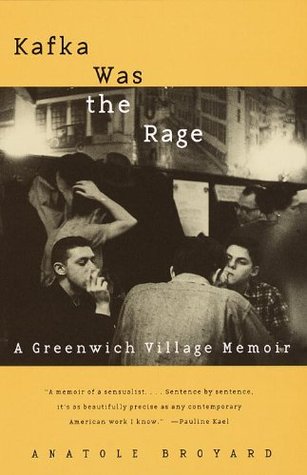More on this book
Community
Kindle Notes & Highlights
“Beauty is the chance meeting, on an operating table, of a sewing machine and an umbrella.”
But now going to school was part of the postwar romance. Studying was almost as good as art. The world was our studio.
They had a blind date with culture, and anything could happen.
Known as the “University in Exile,” the New School had taken in a lot of professors—Jewish and non-Jewish—
who had fled from Hitler on
the same boats as the psyc...
This highlight has been truncated due to consecutive passage length restrictions.
All the courses I took were about what’s wrong: what’s wrong with the government, with the family, with interpersonal relations and intrapersonal relations—what’s wrong with our dreams, our loves, our jobs, our perceptions and conceptions, our esthetics, the human condition
itself.
The building resounded with guttural cries: kunstwissenschaft, zeitgeist and weltanschauung, gemeinschaft
and gesellschaft, schadenfreude, schwarmerei.
We had won the fight against fascism and now, with their help, we would defeat all the dark forces in the culture and the psyche.
Escape from
Freedom,
one of those paeans of lyrical pessimism that Germans specialize in, like Schopenhaue...
This highlight has been truncated due to consecutive passage length restrictions.
no one knew then that we would turn out to be right in trying to escape from freedom.
Fromm was one of the first—perhaps the very first—to come out against pointlessness.
Freudian revisionist.
In one of her books, she had said that, in a sense, the neurotic was healthier than the so-called normal person, because he “protested.” Protesting was like testifying.
When you look back over your life, the thing that amazes you most is your original capacity to believe. To grow older is to lose this capacity, to stop
believing, or to become unable to believe.
The kind of person who is satirized or attacked in a book is often the very person to buy it and pretend to enjoy it.
“The familiar man makes the hero artificial,” Wallace Stevens said.
some of these talkers anticipated the direction that American fiction would eventually take—
away from the heroic, the larger than life, toward the ordinary, t...
This highlight has been truncated due to consecutive passage length restrictions.
In the contest between life and literature, life wins every time.
Mary McCarthy
In New York City in 1946, there was an inevitability about psychoanalysis. It was like having to take the
subway to get anywhere. Psychoanalysis was in the air, like humidity, or smoke. You could almost smell it. The whole establishment had moved to New York in a counterinvasion, a German Marshall Plan.
For most of the people in Meyer Schapiro’s class at the New School, art was the truth about life—and life itself, as they saw it, was more or less a lie.
a certain remorselessness in his brilliance.
It made some of us anxious to think that everything meant something; there was no escape.
Schapiro telling us that before Cézanne, there had always been a place in landscape painting where the viewer could walk into the picture.
There was an entrance; you could go
there, like walking in...
This highlight has been truncated due to consecutive passage length restrictions.
But this was not true of Cézanne’s landscapes, which were cut off absolutely, abstracted from their context. ...
This highlight has been truncated due to consecutive passage length restrictions.
could enter them only through art...
This highlight has been truncated due to consecutive passage length restrictions.
He was discussing an early still life of Picasso’s, an upended table covered with a white cloth, a bowl of flowers, and a bottle of wine, all paradoxically suspended in space.
What we
were seeing, Schapiro said, was the conversion of the horizontal plane—the plane of our ordinary daily traversal of life—into an intimate v...
This highlight has been truncated due to consecutive passage length restrictions.
but Sheri understood, as we do today, that sex
belongs to depression as much as to joy.
She knew that it is a place where all sorts of expectations and illusions come to die. Two people making love, she once said, are like one ...
This highlight has been truncated due to consecutive passage length restrictions.
I hadn’t yet realized that loneliness was not so much a feeling as
a fate. It was loneliness that walked the streets of the Village and filled the bars, loneliness that made it seem such a lively place.
John Crowe Ransom said that the critic must regard the poem as a desperate metaphysical or ontological
maneuver.
High seriousness meant being intimate with largeness, worrying on a grand scale.


